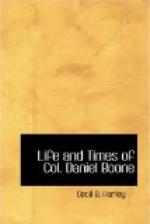“That their situation was critical and delicate: that the force opposed to them was undoubtedly numerous and ready for battle, as might readily be seen from the leisurely retreat of the few Indians who had appeared upon the crest of the hill; that he was well acquainted with the ground in the neighborhood of the Licks, and was apprehensive that an ambuscade was formed at the distance of a mile in advance, where two ravines, one upon each side of the ridge, ran in such a manner that a concealed enemy might assail them at once both in front and flank before they were apprized of the danger.
“It would be proper, therefore, to do one of two things. Either to await the arrival of Logan, who was now undoubtedly on his march to join them; or, if it was determined to attack without delay, that one-half of their number should march up the river, which there bends in an elliptical form, cross at the rapids, and fall upon the rear of the enemy, while the other division attacked them in front. At any rate, he strongly urged the necessity of reconnoitering the ground carefully before the main body crossed the river."[44]
McClung, in his “Western Adventures,” doubts whether the plan of operation proposed by Colonel Boone would have been more successful than that actually adopted; suggesting that the enemy would have cut them off in detail, as at Estill’s defeat.
But before the officers could come to any conclusion, Major McGary dashed into the river on horseback, calling on all who were not cowards to follow. The next moment the whole of the party were advancing to the attack with the greatest ardor, but without any order whatever. Horse and foot struggled through the river together, and, without waiting to form, rushed up the ascent from the shore.
“Suddenly,” says McClung, “the van halted. They had reached the spot mentioned by Boone, where the two ravines head, on each side of the ridge. Here a body of Indians presented themselves, and attacked the van. McGary’s party instantly returned the fire, but under great disadvantage. They were upon a bare and open ridge; the Indians in a bushy ravine. The centre and rear, ignorant of the ground, hurried up to the assistance of the van, but were soon stopped by a terrible fire from the ravine which flanked them. They found themselves enclosed as if in the wings of a net, destitute of proper shelter, while the enemy were in a great measure covered from their fire. Still, however, they maintained their ground. The action became warm and bloody. The parties gradually closed, the Indians emerged from the ravine, and the fire became mutually destructive. The officers suffered dreadfully. Todd and Trigg in the rear, Harland, McBride, and young Israel Boone in front, were already killed.”




